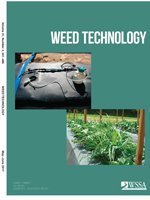Field experiments were conducted at the Ohio Agricultural Research and Development Center in Wooster, OH in 2002 and 2004 to evaluate the tolerance of tomato varieties to halosulfuronmethyl, a selective herbicide used for POST control of broadleaf weeds and nutsedge (Cyperus). POST herbicide treatments included halosulfuron-methyl at 0, 34.7 and 70 g ai ha-1. Plots were evaluated at 1, 3, and 6 wk after treatment (WAT), and yield was recorded at the end of the season. Minimal crop injury was observed 1 and 3 WAT in plots treated with both halosulfuronmethyl rates only in 2002. Although the crop recovered from herbicide injury when treated with the lower rate at 6 WAT, ‘Ohio 8245’, ‘M82’, and ‘E6203’ showed injury at this interval when treated with halosulfuron-methyl at 70 g ha-1. No injury was observed with either rates in 2004. No significant yield reduction was observed in any of the varieties in the test plots. These results indicate that differential tolerance to halosulfuron-methyl does not exists among these tomato varieties with the exception of E6203 and M82.
Nomenclature: Halosulfuron; tomato, Solanum lycopersicum L.





